Analyzing Complex Project Management: Key Issues and Complexity
VerifiedAdded on 2023/06/10
|6
|1062
|483
Discussion Board Post
AI Summary
This discussion paper delves into the complexities of project management, specifically addressing the debate between whether the world is inherently complex or if complexity arises from specific, manageable factors. Drawing upon the work of Stephen Hayes and Daniel Bennett, the paper examines key issues identified as impacting complex projects, such as competition, lack of engagement between industries and government, stakeholder perceptions of success, public and political relations, inadequate procurement practices, and lack of risk acknowledgment. The paper argues that complexity is not a permanent state but is influenced by these factors, refuting the notion of inherent complexity. The discussion concludes that these identified factors significantly impact project outcomes, influencing the management of projects.
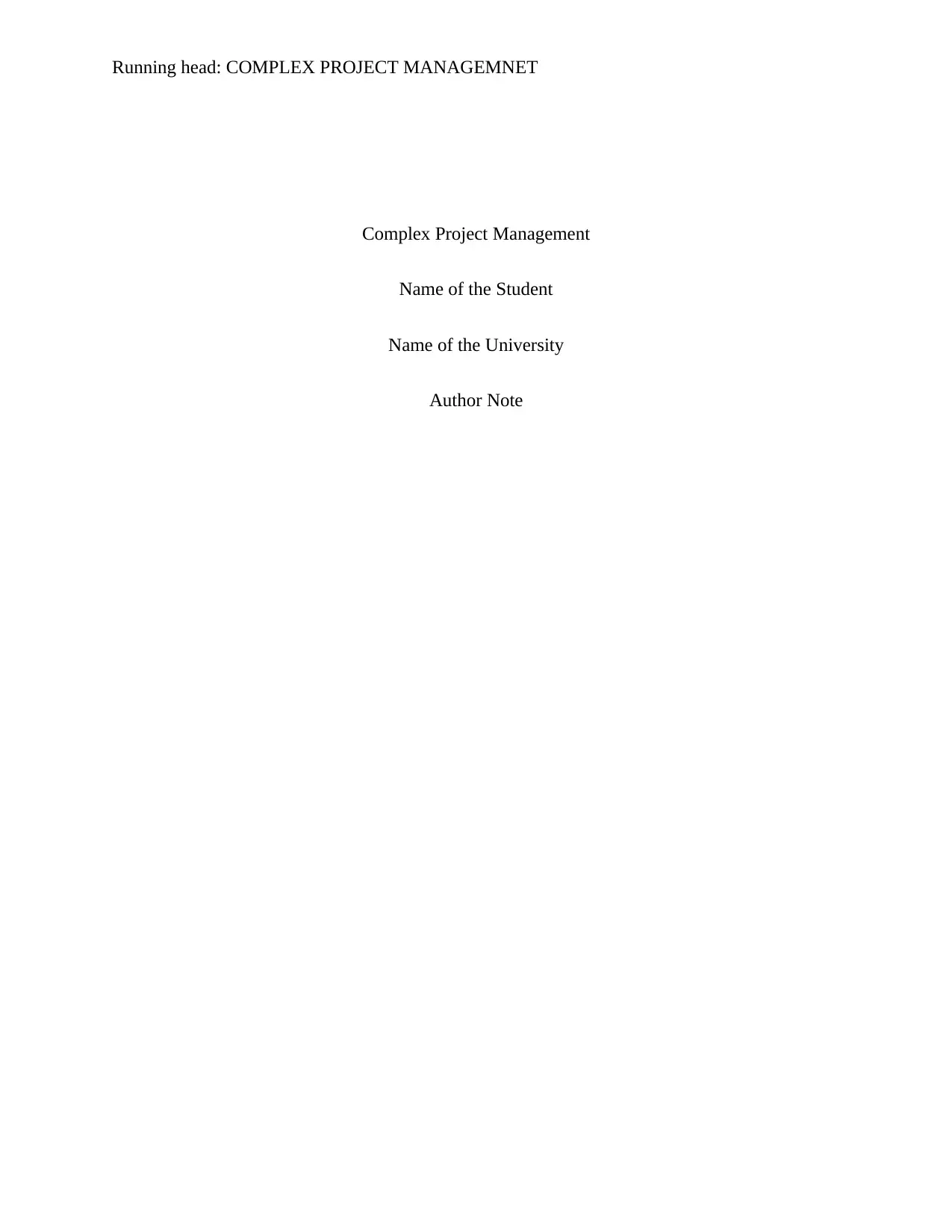
Running head: COMPLEX PROJECT MANAGEMNET
Complex Project Management
Name of the Student
Name of the University
Author Note
Complex Project Management
Name of the Student
Name of the University
Author Note
Paraphrase This Document
Need a fresh take? Get an instant paraphrase of this document with our AI Paraphraser
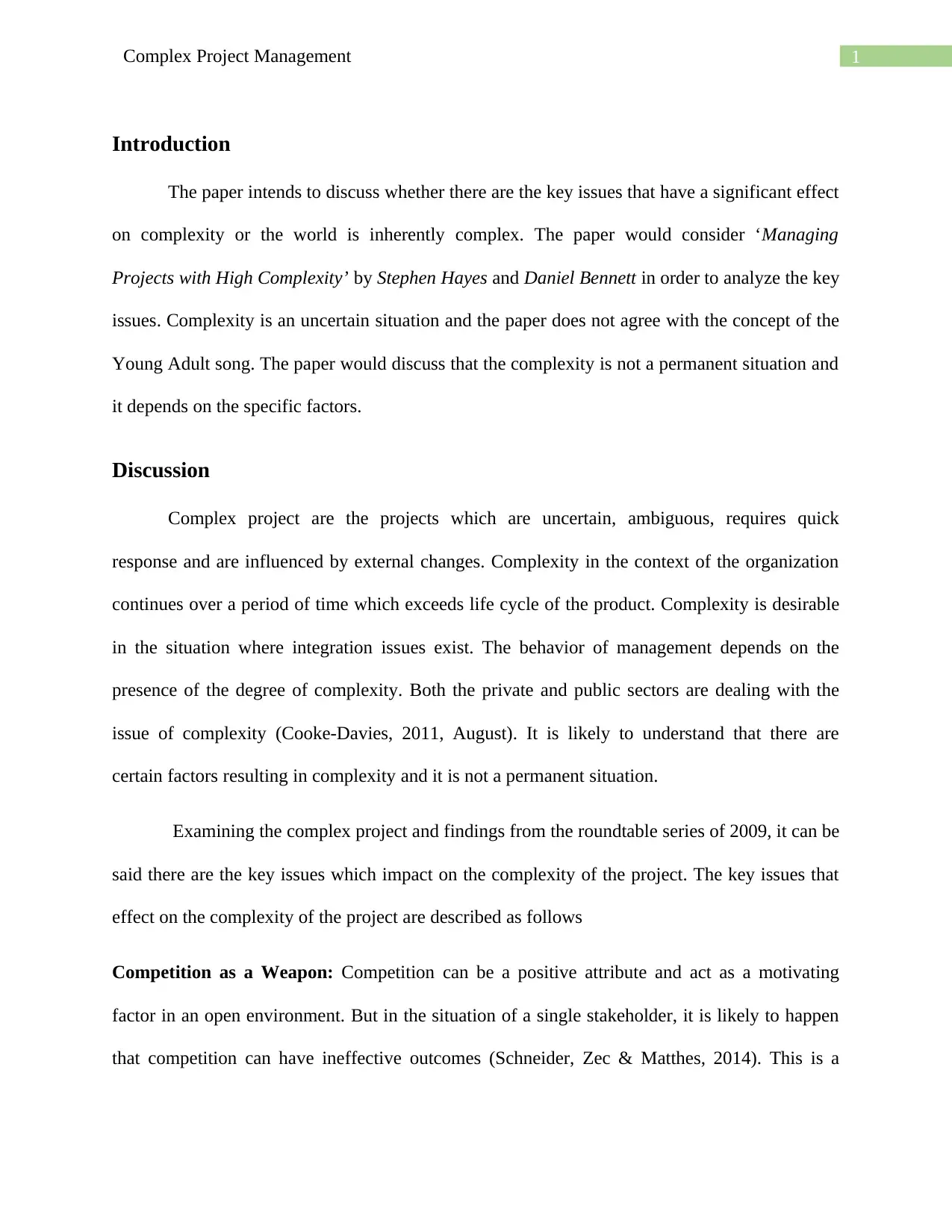
1Complex Project Management
Introduction
The paper intends to discuss whether there are the key issues that have a significant effect
on complexity or the world is inherently complex. The paper would consider ‘Managing
Projects with High Complexity’ by Stephen Hayes and Daniel Bennett in order to analyze the key
issues. Complexity is an uncertain situation and the paper does not agree with the concept of the
Young Adult song. The paper would discuss that the complexity is not a permanent situation and
it depends on the specific factors.
Discussion
Complex project are the projects which are uncertain, ambiguous, requires quick
response and are influenced by external changes. Complexity in the context of the organization
continues over a period of time which exceeds life cycle of the product. Complexity is desirable
in the situation where integration issues exist. The behavior of management depends on the
presence of the degree of complexity. Both the private and public sectors are dealing with the
issue of complexity (Cooke-Davies, 2011, August). It is likely to understand that there are
certain factors resulting in complexity and it is not a permanent situation.
Examining the complex project and findings from the roundtable series of 2009, it can be
said there are the key issues which impact on the complexity of the project. The key issues that
effect on the complexity of the project are described as follows
Competition as a Weapon: Competition can be a positive attribute and act as a motivating
factor in an open environment. But in the situation of a single stakeholder, it is likely to happen
that competition can have ineffective outcomes (Schneider, Zec & Matthes, 2014). This is a
Introduction
The paper intends to discuss whether there are the key issues that have a significant effect
on complexity or the world is inherently complex. The paper would consider ‘Managing
Projects with High Complexity’ by Stephen Hayes and Daniel Bennett in order to analyze the key
issues. Complexity is an uncertain situation and the paper does not agree with the concept of the
Young Adult song. The paper would discuss that the complexity is not a permanent situation and
it depends on the specific factors.
Discussion
Complex project are the projects which are uncertain, ambiguous, requires quick
response and are influenced by external changes. Complexity in the context of the organization
continues over a period of time which exceeds life cycle of the product. Complexity is desirable
in the situation where integration issues exist. The behavior of management depends on the
presence of the degree of complexity. Both the private and public sectors are dealing with the
issue of complexity (Cooke-Davies, 2011, August). It is likely to understand that there are
certain factors resulting in complexity and it is not a permanent situation.
Examining the complex project and findings from the roundtable series of 2009, it can be
said there are the key issues which impact on the complexity of the project. The key issues that
effect on the complexity of the project are described as follows
Competition as a Weapon: Competition can be a positive attribute and act as a motivating
factor in an open environment. But in the situation of a single stakeholder, it is likely to happen
that competition can have ineffective outcomes (Schneider, Zec & Matthes, 2014). This is a
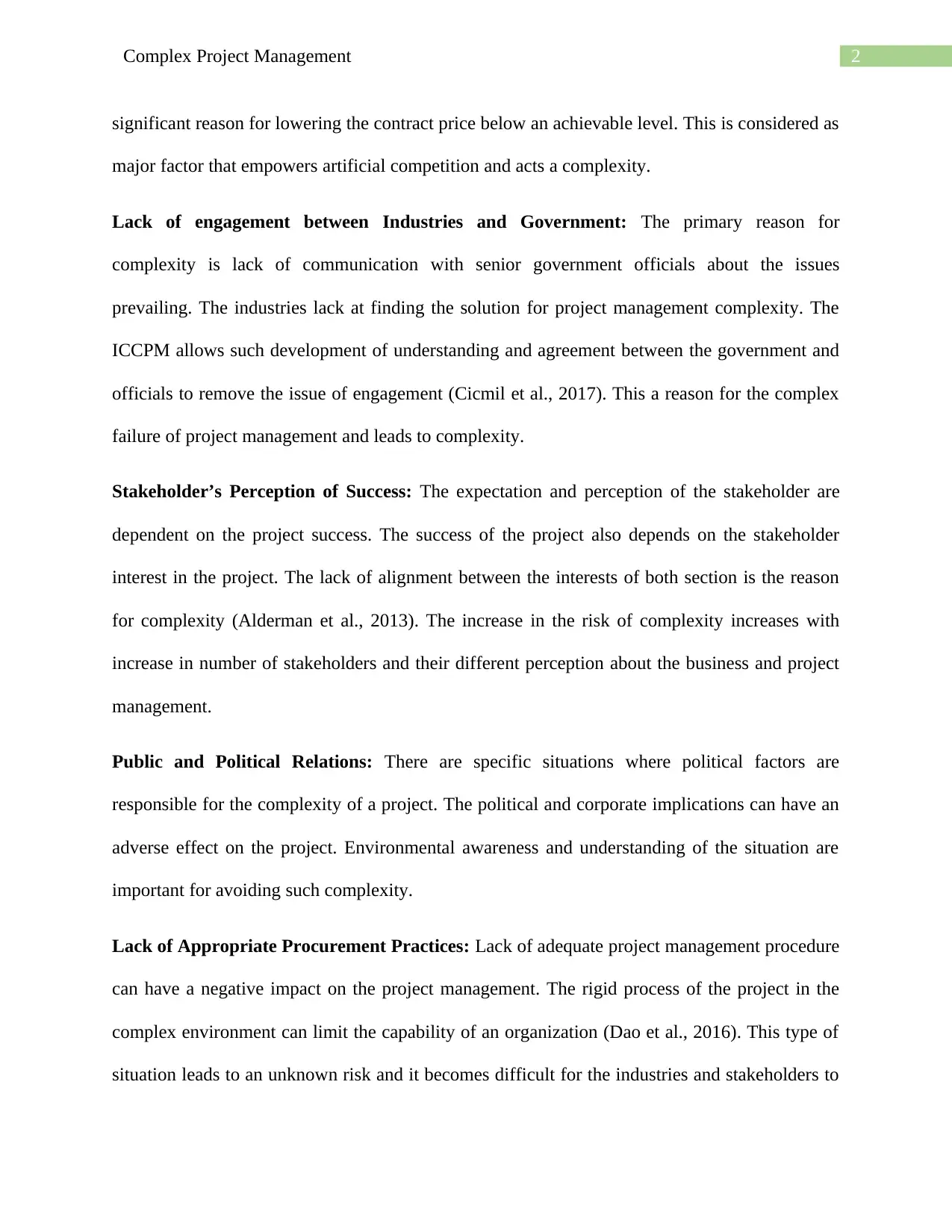
2Complex Project Management
significant reason for lowering the contract price below an achievable level. This is considered as
major factor that empowers artificial competition and acts a complexity.
Lack of engagement between Industries and Government: The primary reason for
complexity is lack of communication with senior government officials about the issues
prevailing. The industries lack at finding the solution for project management complexity. The
ICCPM allows such development of understanding and agreement between the government and
officials to remove the issue of engagement (Cicmil et al., 2017). This a reason for the complex
failure of project management and leads to complexity.
Stakeholder’s Perception of Success: The expectation and perception of the stakeholder are
dependent on the project success. The success of the project also depends on the stakeholder
interest in the project. The lack of alignment between the interests of both section is the reason
for complexity (Alderman et al., 2013). The increase in the risk of complexity increases with
increase in number of stakeholders and their different perception about the business and project
management.
Public and Political Relations: There are specific situations where political factors are
responsible for the complexity of a project. The political and corporate implications can have an
adverse effect on the project. Environmental awareness and understanding of the situation are
important for avoiding such complexity.
Lack of Appropriate Procurement Practices: Lack of adequate project management procedure
can have a negative impact on the project management. The rigid process of the project in the
complex environment can limit the capability of an organization (Dao et al., 2016). This type of
situation leads to an unknown risk and it becomes difficult for the industries and stakeholders to
significant reason for lowering the contract price below an achievable level. This is considered as
major factor that empowers artificial competition and acts a complexity.
Lack of engagement between Industries and Government: The primary reason for
complexity is lack of communication with senior government officials about the issues
prevailing. The industries lack at finding the solution for project management complexity. The
ICCPM allows such development of understanding and agreement between the government and
officials to remove the issue of engagement (Cicmil et al., 2017). This a reason for the complex
failure of project management and leads to complexity.
Stakeholder’s Perception of Success: The expectation and perception of the stakeholder are
dependent on the project success. The success of the project also depends on the stakeholder
interest in the project. The lack of alignment between the interests of both section is the reason
for complexity (Alderman et al., 2013). The increase in the risk of complexity increases with
increase in number of stakeholders and their different perception about the business and project
management.
Public and Political Relations: There are specific situations where political factors are
responsible for the complexity of a project. The political and corporate implications can have an
adverse effect on the project. Environmental awareness and understanding of the situation are
important for avoiding such complexity.
Lack of Appropriate Procurement Practices: Lack of adequate project management procedure
can have a negative impact on the project management. The rigid process of the project in the
complex environment can limit the capability of an organization (Dao et al., 2016). This type of
situation leads to an unknown risk and it becomes difficult for the industries and stakeholders to
⊘ This is a preview!⊘
Do you want full access?
Subscribe today to unlock all pages.

Trusted by 1+ million students worldwide
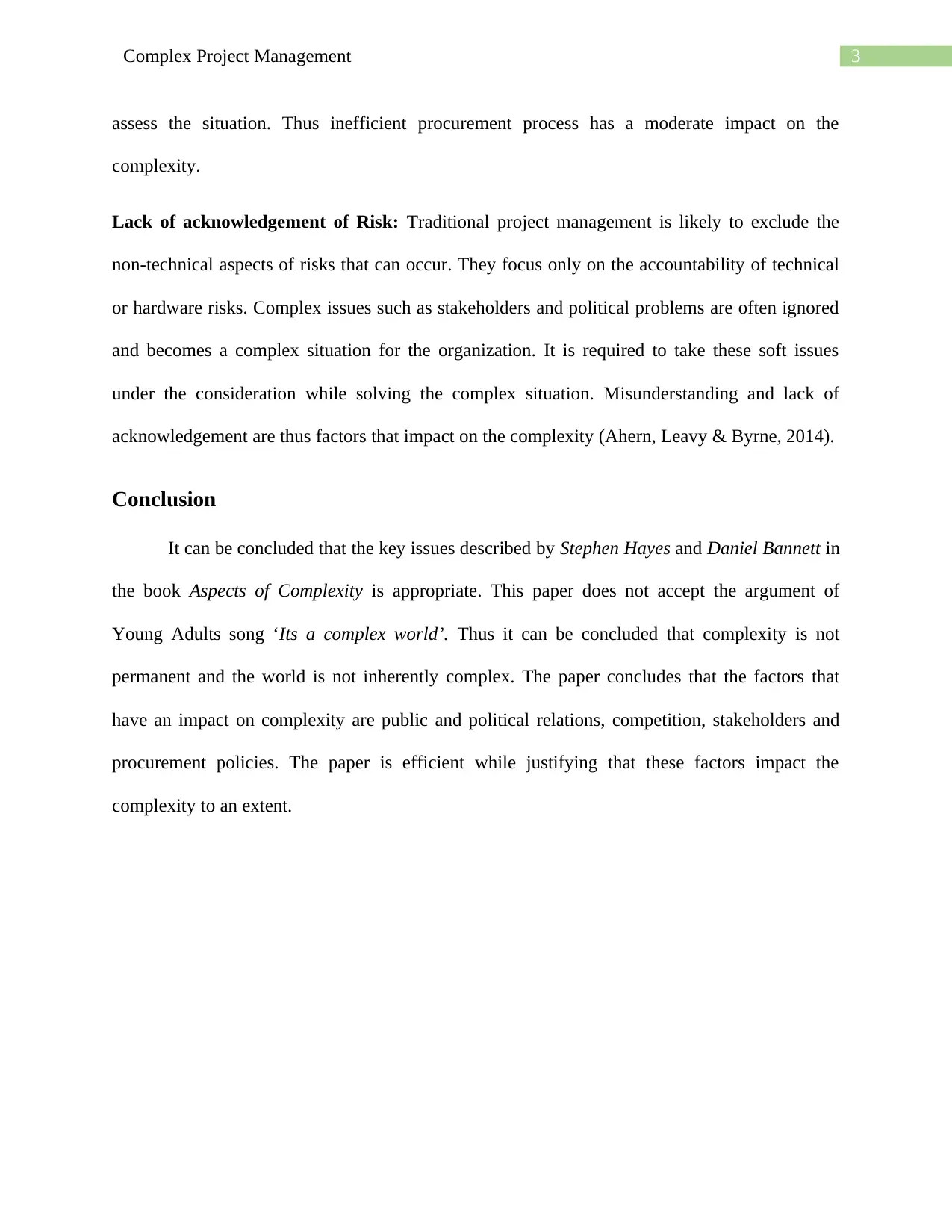
3Complex Project Management
assess the situation. Thus inefficient procurement process has a moderate impact on the
complexity.
Lack of acknowledgement of Risk: Traditional project management is likely to exclude the
non-technical aspects of risks that can occur. They focus only on the accountability of technical
or hardware risks. Complex issues such as stakeholders and political problems are often ignored
and becomes a complex situation for the organization. It is required to take these soft issues
under the consideration while solving the complex situation. Misunderstanding and lack of
acknowledgement are thus factors that impact on the complexity (Ahern, Leavy & Byrne, 2014).
Conclusion
It can be concluded that the key issues described by Stephen Hayes and Daniel Bannett in
the book Aspects of Complexity is appropriate. This paper does not accept the argument of
Young Adults song ‘Its a complex world’. Thus it can be concluded that complexity is not
permanent and the world is not inherently complex. The paper concludes that the factors that
have an impact on complexity are public and political relations, competition, stakeholders and
procurement policies. The paper is efficient while justifying that these factors impact the
complexity to an extent.
assess the situation. Thus inefficient procurement process has a moderate impact on the
complexity.
Lack of acknowledgement of Risk: Traditional project management is likely to exclude the
non-technical aspects of risks that can occur. They focus only on the accountability of technical
or hardware risks. Complex issues such as stakeholders and political problems are often ignored
and becomes a complex situation for the organization. It is required to take these soft issues
under the consideration while solving the complex situation. Misunderstanding and lack of
acknowledgement are thus factors that impact on the complexity (Ahern, Leavy & Byrne, 2014).
Conclusion
It can be concluded that the key issues described by Stephen Hayes and Daniel Bannett in
the book Aspects of Complexity is appropriate. This paper does not accept the argument of
Young Adults song ‘Its a complex world’. Thus it can be concluded that complexity is not
permanent and the world is not inherently complex. The paper concludes that the factors that
have an impact on complexity are public and political relations, competition, stakeholders and
procurement policies. The paper is efficient while justifying that these factors impact the
complexity to an extent.
Paraphrase This Document
Need a fresh take? Get an instant paraphrase of this document with our AI Paraphraser

4Complex Project Management
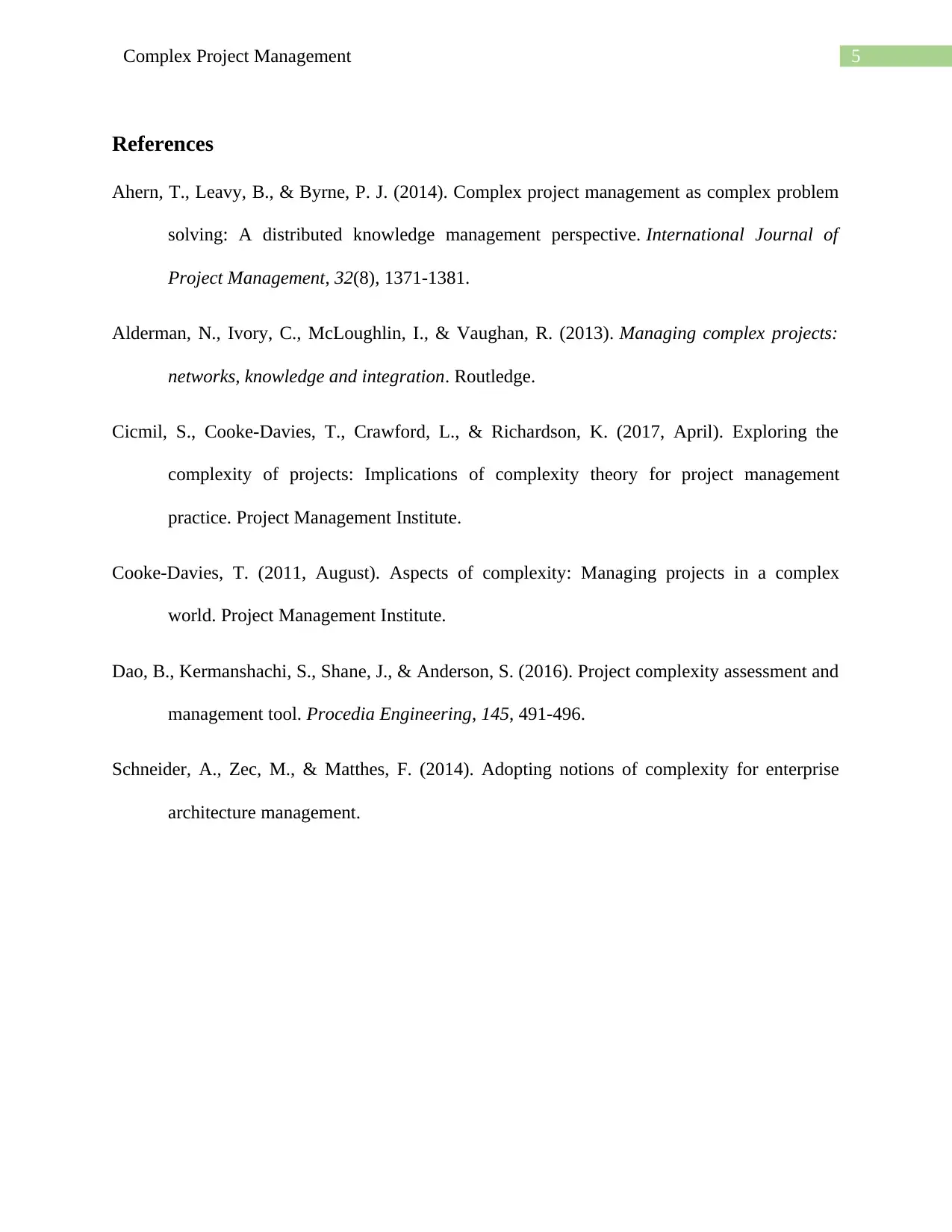
5Complex Project Management
References
Ahern, T., Leavy, B., & Byrne, P. J. (2014). Complex project management as complex problem
solving: A distributed knowledge management perspective. International Journal of
Project Management, 32(8), 1371-1381.
Alderman, N., Ivory, C., McLoughlin, I., & Vaughan, R. (2013). Managing complex projects:
networks, knowledge and integration. Routledge.
Cicmil, S., Cooke-Davies, T., Crawford, L., & Richardson, K. (2017, April). Exploring the
complexity of projects: Implications of complexity theory for project management
practice. Project Management Institute.
Cooke-Davies, T. (2011, August). Aspects of complexity: Managing projects in a complex
world. Project Management Institute.
Dao, B., Kermanshachi, S., Shane, J., & Anderson, S. (2016). Project complexity assessment and
management tool. Procedia Engineering, 145, 491-496.
Schneider, A., Zec, M., & Matthes, F. (2014). Adopting notions of complexity for enterprise
architecture management.
References
Ahern, T., Leavy, B., & Byrne, P. J. (2014). Complex project management as complex problem
solving: A distributed knowledge management perspective. International Journal of
Project Management, 32(8), 1371-1381.
Alderman, N., Ivory, C., McLoughlin, I., & Vaughan, R. (2013). Managing complex projects:
networks, knowledge and integration. Routledge.
Cicmil, S., Cooke-Davies, T., Crawford, L., & Richardson, K. (2017, April). Exploring the
complexity of projects: Implications of complexity theory for project management
practice. Project Management Institute.
Cooke-Davies, T. (2011, August). Aspects of complexity: Managing projects in a complex
world. Project Management Institute.
Dao, B., Kermanshachi, S., Shane, J., & Anderson, S. (2016). Project complexity assessment and
management tool. Procedia Engineering, 145, 491-496.
Schneider, A., Zec, M., & Matthes, F. (2014). Adopting notions of complexity for enterprise
architecture management.
⊘ This is a preview!⊘
Do you want full access?
Subscribe today to unlock all pages.

Trusted by 1+ million students worldwide
1 out of 6
Related Documents
Your All-in-One AI-Powered Toolkit for Academic Success.
+13062052269
info@desklib.com
Available 24*7 on WhatsApp / Email
![[object Object]](/_next/static/media/star-bottom.7253800d.svg)
Unlock your academic potential
Copyright © 2020–2026 A2Z Services. All Rights Reserved. Developed and managed by ZUCOL.


